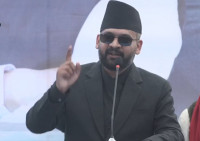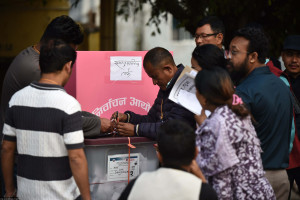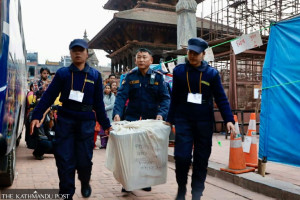National
In a first, Tribhuvan University takes action against its teaching faculty for plagiarism
Lack of action in the past had led to an increase in the incidence of plagiarism by Nepali academics, educationists say.
Binod Ghimire
The Tribhuvan University has taken action against its seven teaching staff including a professor in a plagiarism case.
An investigation team led by Professor Ram Chandra Basnet formed to investigate into the charge of plagiarism found that a team of lecturers led by Prashuram Mishra, a professor of Chemistry at Mahendra Morang Campus Biratnagar, had copied a research by a French professor Armel Le Bail in their journal article.
The oldest varsity of the country had formed a probe team led by Basnet following complaints from Le Bail from University of Maine in France which found that the Mishra’s team had plagiarised a scientific research on Chemistry. The TU’s executive committee has banned Mishra and associate professors Janak Adhikari, Yubraj Sahu, Bimal Kantha and Hareram Mishra from their involvement in any research activities for two years. Similarly, it has banned Rohit Dev, a part time lecturer, from teaching in any colleges across the country.
“To my knowledge, this is the first time the university took action in plagiarism,” Shiva Lal Bhusal, rector at the university, told the Post. “The university will not spare anyone in such cases.”
This, however, is not the first plagiarism case reported in the university.
In 2013, professors of Chemistry Kedar Nath Ghimire, Dev Bahadur Khadka and Meghraj Pokharel were found to have plagiarised a research article submitted at the University Grants Commission for a grant. Though the commission barred them from any research in the future, the university took no action against them.
Ghimire later went on to become a member of the Tribhuvan University Service Commission.
Similarly, Tirtha Khaniya was picked as a vice-chancellor of the varsity in August 2015 while he was facing a plagiarism allegation. Khaniya has already retired.
While heading the English Education Department at the university in 2006, Khaniya had lifted a section of an article written by Ferit Kilickaya, associate professor at Middle East Technical University and Mehmet Akif Ersoy University, Turkey. He had copied a huge chunk from Kilickaya’s article “Authentic Materials and Cultural Content in EFL Classrooms” in his article written for the Nepal English Language Teachers’ Association in 2006.
Though Khaniya denied the allegation, Kilickaya in an email conversation with the Post in 2015 had said the association following his complaint had withdrawn Khaniya’s article from its website.
“When I checked this article, I was shocked because it copied most of my article,” Filickaya had said in an email. “I wanted a legal action against him but couldn’t do it because I was unaware about Nepal’s legal system.”
The professors at the university say lack of actions from the varsity is one of the reasons behind plagiarism practice in Nepal.
“It is positive that the university has at least started initiating action,” Chhaitanya Sharma, former chair of the university’s service commission, told the Post.
Sharma said when he was in the commission he had found many lecturers involved in plagiarism. The research and journal articles carry certain marks for promotion to the positions of associate professor and professor.
In an attempt to discourage plagiarism, Sharma said he had introduced the provision where only peer reviewed articles were considered for marking.
Bhusal said they are serious about controlling plagiarism as it ruins the image of the university. “We are in the final preparation to install software to check plagiarism as one the steps to control it,” he said.




 11.9°C Kathmandu
11.9°C Kathmandu















